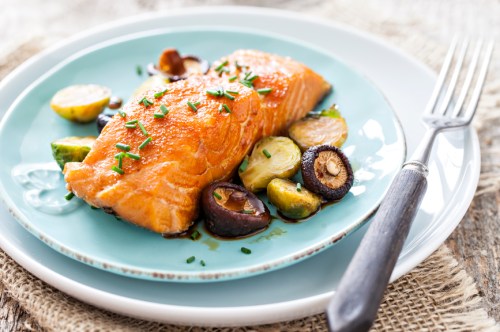5 Foods High in Tryptophan That Help You Sleep and Fight Inflammation at the Same Time
Tryptophan does more than make you sleepy. Here's why it might aid in inflammation, plus five foods with tryptophan that aren't turkey.

Chances are, when you hear the word “tryptophan,” you think of sleep. The amino acid, which is found in foods like salmon, lentils, and of course, turkey, is notorious for making consumers feel like they need a good nap. That’s because tryptophan increases the body’s relaxation hormones, like serotonin and melatonin, leading to a sleepy, lethargic feeling post-meal.
Experts in This Article
Alabama-based registered dietitian
registered dietitian and author of The Better Period Food Solution.
Turns out, it might offer more nutritional benefits than just a good night’s sleep. Recent research suggests that higher levels of tryptophan can potentially aid in fighting inflammation, especially as we get older.
A study published in May in the International Journal of Molecular Sciences examined how tryptophan levels in older mice protected against inflammation and overall gut health. Mice who ate diets low in tryptophan for eight weeks had altered gut microbiota compositions and significantly elevated levels of inflammatory markers in their blood. While it’s important to note that these findings were found in animals, not humans, the results suggest that higher tryptophan levels might aid in fighting gut inflammation, particularly as we age.
Not in the mood for turkey? No problem. Here are five other foods both high in tryptophan and anti-inflammatory nutrients.
5 foods with tryptophan, so you can sleep better and fight inflammation all at once
1. Peanut butter
Want a dietitian-approved bedtime snack with natural anti-inflammatory properties? Skip the cookies and milk and opt for a fresh banana and creamy nut butter instead.
As Tracy Lockwood Beckerman, RD, reveals in a previous episode of You Versus Food, bananas are a natural muscle relaxer, thanks to their levels of potassium and magnesium. Studies show their antioxidant properties can also ward off inflammation across the body. “Eating carbohydrates, like a banana, with tryptophan, found in nut butter, can make the amino acid more available to the brain, and may increase your ability to sleep,” Beckerman says in the video below. “This treat is a sleep aid wonder.”
Learn what else a dietitian wants you to know about eating before bed, here.
2. Pumpkin seeds
Pumpkin seeds are natural sources of tryptophan and magnesium—a calming nutrient that can help bring on the ZZZs. As registered dietitian Andrea Mathis, RDN, previously told Well+Good, they’re also high in inflammatory properties that can help support overall health and cognition.
“Pumpkin seed oil contains the antioxidants carotenoids and vitamin E, and antioxidants play a role in lowering inflammation,” she said. But note: Oils only contain small amounts of the each nutrient. For the full anti-inflammatory effect (and a better night’s rest), stick to the full seeds.
3. Salmon
The oily fish is loaded with healthy omega-3 fatty acids, aka the “good” fats that are linked with low blood pressure and cholesterol. It’s also a good source of tryptophan, so it’s great for a good night’s sleep.
As if it wasn’t already a health food superstar, salmon is also naturally rich in vitamin D—a nutrient that plays a key role in functions like bone growth, cell functioning, and anti-inflammation. As Beckerman previously shared with Well+Good, just three ounces of the tasty fish provides 71 percent of your daily intake. So eat up.
Double-down on your vitamin D with more foods below:
4. Spinach
Like most leafy greens, spinach is packed with antioxidants and vitamin K—an anti-inflammatory nutrient found in similar veggies, like cabbage, broccoli, and kale.
If you need another reason to eat your greens, this salad staple is also a great source of tryptophan. Research shows spinach is an all-around excellent “brain food” that can support sleep and mood alike thanks to its amino acid profile.
5. Edamame
Edamame is more than a delicious pre-sushi snack. The soybean dish is packedwith all of the essential amino acids, like tryptophan, leucine, threonine, and lycine. Like pumpkin seeds, it’s also a natural source of magnesium, so expect even more calming sensations.
As for anti-inflammatory nutrients, soybeans are also a great source of antioxidants that aid in relieving joint pain. (As for old wellness-circle fears that the bean is bad for hormone health? Consider that myth busted.)
Oh hi! You look like someone who loves free workouts, discounts for cult-fave wellness brands, and exclusive Well+Good content. Sign up for Well+, our online community of wellness insiders, and unlock your rewards instantly.










